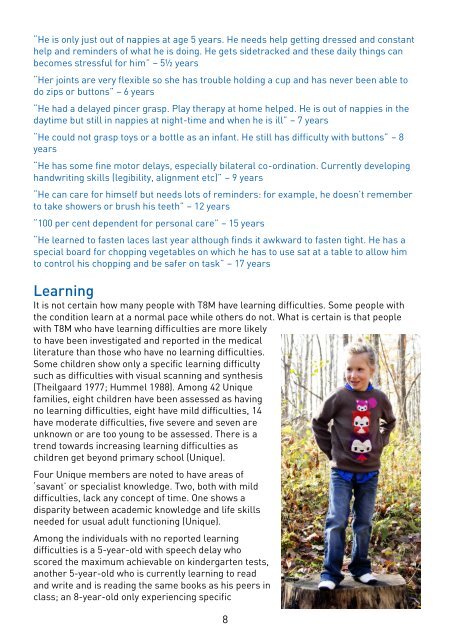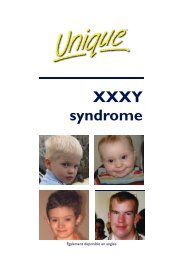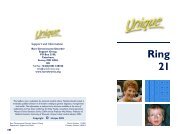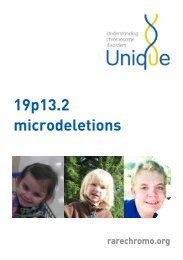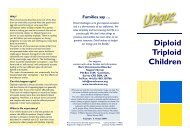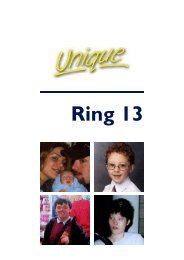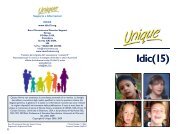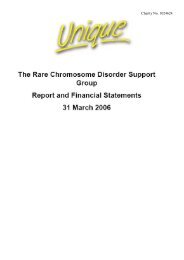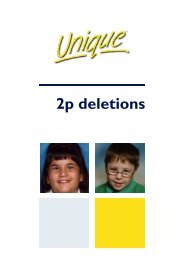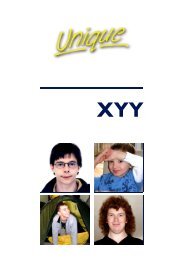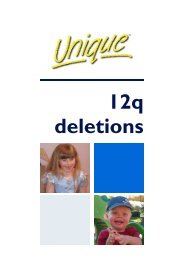Trisomy 8 Mosaicism - Unique - The Rare Chromosome Disorder ...
Trisomy 8 Mosaicism - Unique - The Rare Chromosome Disorder ...
Trisomy 8 Mosaicism - Unique - The Rare Chromosome Disorder ...
Create successful ePaper yourself
Turn your PDF publications into a flip-book with our unique Google optimized e-Paper software.
“He is only just out of nappies at age 5 years. He needs help getting dressed and constant<br />
help and reminders of what he is doing. He gets sidetracked and these daily things can<br />
becomes stressful for him” – 5½ years<br />
“Her joints are very flexible so she has trouble holding a cup and has never been able to<br />
do zips or buttons” – 6 years<br />
“He had a delayed pincer grasp. Play therapy at home helped. He is out of nappies in the<br />
daytime but still in nappies at night-time and when he is ill” – 7 years<br />
“He could not grasp toys or a bottle as an infant. He still has difficulty with buttons” – 8<br />
years<br />
“He has some fine motor delays, especially bilateral co-ordination. Currently developing<br />
handwriting skills (legibility, alignment etc)” – 9 years<br />
“He can care for himself but needs lots of reminders: for example, he doesn’t remember<br />
to take showers or brush his teeth” – 12 years<br />
“100 per cent dependent for personal care” – 15 years<br />
“He learned to fasten laces last year although finds it awkward to fasten tight. He has a<br />
special board for chopping vegetables on which he has to use sat at a table to allow him<br />
to control his chopping and be safer on task” – 17 years<br />
Learning<br />
It is not certain how many people with T8M have learning difficulties. Some people with<br />
the condition learn at a normal pace while others do not. What is certain is that people<br />
with T8M who have learning difficulties are more likely<br />
to have been investigated and reported in the medical<br />
literature than those who have no learning difficulties.<br />
Some children show only a specific learning difficulty<br />
such as difficulties with visual scanning and synthesis<br />
(<strong>The</strong>ilgaard 1977; Hummel 1988). Among 42 <strong>Unique</strong><br />
families, eight children have been assessed as having<br />
no learning difficulties, eight have mild difficulties, 14<br />
have moderate difficulties, five severe and seven are<br />
unknown or are too young to be assessed. <strong>The</strong>re is a<br />
trend towards increasing learning difficulties as<br />
children get beyond primary school (<strong>Unique</strong>).<br />
Four <strong>Unique</strong> members are noted to have areas of<br />
‘savant’ or specialist knowledge. Two, both with mild<br />
difficulties, lack any concept of time. One shows a<br />
disparity between academic knowledge and life skills<br />
needed for usual adult functioning (<strong>Unique</strong>).<br />
Among the individuals with no reported learning<br />
difficulties is a 5-year-old with speech delay who<br />
scored the maximum achievable on kindergarten tests,<br />
another 5-year-old who is currently learning to read<br />
and write and is reading the same books as his peers in<br />
class; an 8-year-old only experiencing specific<br />
8


